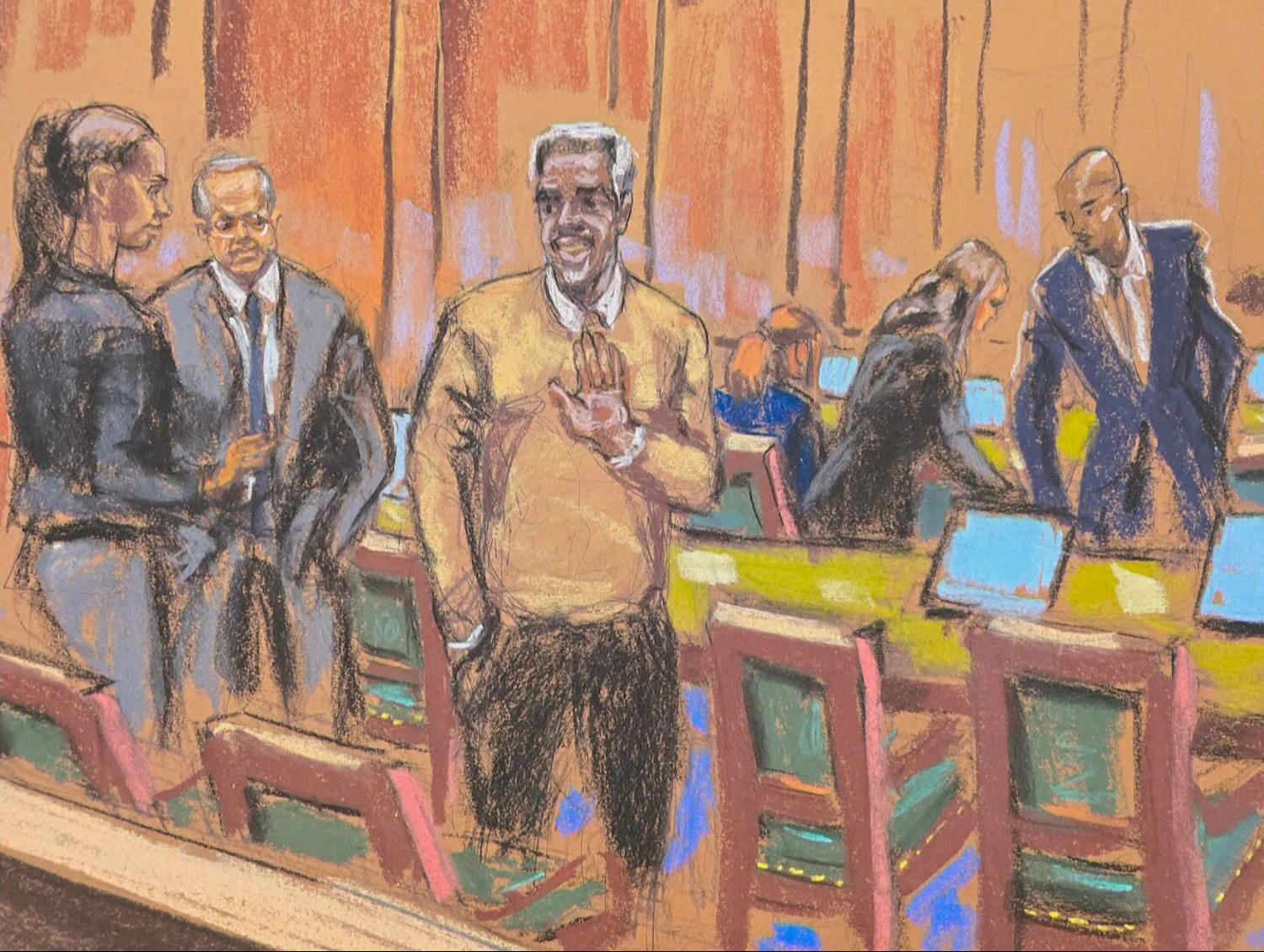
This is a free article for Diddy on Trial newsletter subscribers. Sign up to get exclusive reporting and analysis throughout Sean Combs’ federal trial.
The U.S. government rested its case against Diddy today — and then, exactly two hours later, so did his defense team.
In total, federal prosecutors called 34 witnesses across more than six weeks, presenting jurors with graphic evidence of what they allege was a ruthless criminal enterprise orchestrated by the hip-hop tycoon.
Diddy’s lawyers chose not to call a single witness, though they submitted evidence and stipulations in their client’s defense. The rapper’s team also made what’s known as a Rule 29 motion to dismiss the case, arguing that prosecutors’ evidence wasn’t sufficient to stand up a conviction. U.S. District Judge Arun Subramanian didn’t immediately decide on that request.
We’re now entering what’s likely to be the final phase of this trial. The jurors will get a break tomorrow while the judge and lawyers meet to hash out instructions for the 12-person panel. The attorneys are expected to deliver closing arguments starting Thursday.
Here’s what else you need to know about Day 29 of the trial:
- Teny Geragos, one of Diddy’s lawyers, cross-examined Joseph Cerciello, a special agent with Homeland Security Investigations. Geragos focused on a series of text messages suggesting that Diddy’s ex-girlfriend “Jane” played an active role in setting up hotel encounters with sex workers, including a man named Kabrale. (NBC News previously identified the sex worker as Cabral.)
- The jury was shown more explicit videos of “freak offs” featuring Jane and a sex worker named Paul. It initially appeared three jurors were having technical issues with their headsets as one 90-second clip played — but then it became clear they’d failed to turn them on properly. The marathon sexual encounters are at the heart of the government’s racketeering conspiracy and sex trafficking case.
🔎 The view from inside
By Adam Reiss, Chloe Melas, Katherine Koretski and Jing Feng
In a notable exchange near the end of the day, Subramanian asked Diddy how he was feeling. “I am doing great. Thank you, Your Honor,” the rapper replied. He added: “You’re doing an excellent job.”
Subramanian then tried to confirm that Diddy wouldn’t take the stand in his own defense: “Is it your decision not to testify?” Diddy replied: “That is my decision. That is totally my decision. My decision; I am making it.”
👨⚖️ Analysis: Playing it safe
By Danny Cevallos
Today Diddy’s team made its motion for a judgment of acquittal after the government’s case, and the judge said he would decide on the motion. It’s a formality: The motion will surely be denied. The defense knows it will most likely be denied.
But the rules require that, in order to preserve arguments, the defense has to move for a Rule 29 judgment of acquittal after the prosecution rests.
I can count on one finger the number of Rule 29 motions I’ve seen granted in federal court. That’s because federal prosecutors generally don’t accidentally forget to put in evidence of a crime or its elements. No one on either side expects this motion to be granted. It’s more for preservation of the record for appeal. Still, judges often deny these motions right away, but that hasn’t happened just yet. Could that mean the motion has a chance? Most likely not.
Diddy’s defense team confirmed in court that it wouldn’t call witnesses and would be introducing exhibits only.
I’ve been asked whether the defense team called no witnesses because it is feeling confident. I’ve also been asked whether the defense called no witnesses because it thinks the case is hopeless. I’d say the answer is “neither.”
You don’t get to the level of these hugely successful defense attorneys by having a negative attitude. But at the same time, defense attorneys are never as Pollyannaish as the clients, who almost always think the prosecution has nothing on them and the cases are dogs.
The choice not to call witnesses is the safest, most risk-averse strategy. Whether Diddy’s lawyers are feeling optimistic or pessimistic, they are clearly one thing: practical.
PSA: Every night during Diddy’s trial, NBC’s “Dateline” will drop special episodes of the “True Crime Weekly” podcast to get you up to speed. “Dateline” correspondent Andrea Canning chats with NBC News’ Chloe Melas and special guests — right in front of the courthouse. Listen here. 🎧
